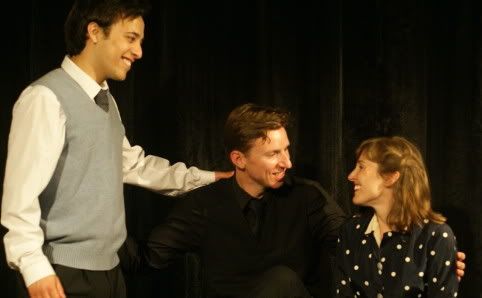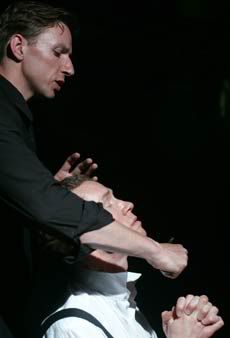Ah, my first Hamlet since deciding to attempt the Grand Hamlet-Off of 2011 and given that this was a chance to see the rarely performed Bad Quarto of 1603 (hence the title) - one I was very excited for. And I was far from disappointed, in fact I’m looking forward to heading back to see this when I’m a little less exhausted in May. In short, I adored it and I fear large parts of this entry will just be me listing all the things I loved most.
I suspect I ought to start, obviously enough, with the differences in the text and they are vast (though many productions use a combination of the two). This isn’t simply a few changes in the dialogue here and there, it’s an entirely different play. Though the basic story has remained the same characters names have changed (we have Corambis rather than Polonius for example), large sections of dialogue have disappeared (most of the soliloquies haven’t made the cut), dialogue not known in any of the other versions has appeared and entire scenes have sprung out of nowhere. It means there’s a slight dissonance when you’re watching it – moments where you’re expecting one thing and get another.
The current literary consensus is that this was a version pieced together by one of the touring actors from his not too clear memory an idea I find fascinating. If true it gives us an insight of sorts into how Shakespeare’s players felt about his play and how they performed it. There are a lot more stage directions, for example, who knew that the ghost would have been wearing a nightcap or that Ophelia’s (or Ofelia as she appears in this text) madness could only be represented by her entering carrying a lute. Motivations are also much more clearly spelled out here – Gertrude, for example, clearly doesn’t know about her first husbands murder and is not only appalled to find out, but in a scene with Horatio actively plots against Claudius to help Hamlet. Interestingly, some of the “new” text to me felt familiar, as if it had been lifted from different plays though I haven’t found time to compare them properly yet and I can’t quite shake the joyful image of the actor sitting down to write Gertrude’s speech about Ophelia’s death:- “She came garlanded with.... with.... sundry flowers.”
Really, all that aside, what matters though is the affect this has on the piece. Certainly a lot of the poetry and mental acrobatics are lost but the passion, anger and pain at the play’s heart still remain and is deeply felt. Coming in at roughly two hours, it’s a much more pacy, edge of your seat experience. Hamlet himself, excellently played by Jamie Matthewman, is much more rough and ready, the hesitation is gone, replaced by determination. Oddly enough this made the character feel more mature to me, and combined with a relatively youthful Claudius in Robert Lonergan (more a peer for Hamlet than an elder) it felt much more like his position had been unfairly usurped than I’ve normally seen. A moment when he perched upon the back of the chairs and spoke directly to the audience, painted him as a consummate, personal, friendly and relatable politician (not a combination we’re familiar with today). He was confident, decisive, intelligent and physically impressive – a clear candidate for the next ruler. An affect achieved partly through the different text, partly through casting and partly through the production itself.
Despite thoroughly enjoying the opportunity to revel in the different text, what really won me over was the production itself. I’ve frequently been heard to complain that I’m suffering from too many Hamlets in hoodies (there may even be a hoody count in the end of the year Hamlet-Off, though so far it’s been pleasantly hoody free), here instead we were treated to a beautiful 40s aesthetic which I thought worked exceptionally well – spanning that eras transition between gentility and violence. It also allowed for the use of a beautiful Billie Holiday song, It's Like Reaching For The Moon, woven through the piece and most notably sung beautifully by Pamela Banks during the players performance. The song enthused the entire play with a coherent atmosphere and a sensuous melancholy. Banks’ performance was also echoed wonderfully by Rebecca Pownell’s Ofelia during her mad scene, her mind selecting an experience from her recent past to both escape and explore the depths of her grief.
In fact, the players appearances proved to be some of my favourites from the play – both because of the ripples they sent out through the rest of the play and because it felt more grounded in the era of the production. I often find these scenes more than any other an abrupt departure, creating a fracture in my suspension of belief – but here it worked well. It also had some nice comedy touches, with Hamlet’s advice to the actors seeming much more in depth and insulting than I normally remember.
The production also made excellent use of the intimacy of the White Bear, which I’ve been hoping to see in the venue but so far hadn’t (in all fairness, it wouldn’t have been fitting in Holding Hands at Paschendaele, but Little Shop of Horrors could definitely have made more of it). Not only did we have Hamlet’s direct interaction with the audience, but also Claudius and Gertrude sat with us during the players scene and, most memorably, the ghost suddenly rose from our midst at the beginning of the play giving the audience some sense of the character’s shock (I really liked the lighting in this scene as well, created mostly through the use of torches the actors were holding).
Another element of this production that left me overjoyed was a collection of wonderful female performances, as alongside Gertrude and Ofelia we had a female Guildenstern (or rather Gilderstone) played by Lucy Lill and a female Horatio in the form of Katie Hayes. Hayes, in particular was wonderful – both sexy and controlled and much more active within the play. Although this strengthening of Horatio, somewhat sidelined Hamlet’s relationship with Ofelia (especially given his flirtatiousness with all the females in the cast – barring his mother – and earning him the title of Ladies Man Hamlet), it made Horatio seem much more Hamlet’s equal in my eyes, which I thought was great.
I also found myself quite liking this reduction in the Hamlet and Ofelia relationship, I think it focused a sense that her madness, an admirably brittle performance by Pownell, is inspired more by the loss of her father and her isolation that Hamlet’s scorn. This focus on family also benefited from similarly excellent performances from Maurice Byrne as a softly spoken and charming Corambis/Polonius and a truly stunning emotional performance by Matthew Spencer as Laertes.
All in all this was an interesting exploration of a little played part of Shakespearean history (and its well worth staying for the after show chats on Thursday and Saturdays to explore it more), utterly enriched by a beautiful production and an excellent cast. Now I’m off to play Daggers... and if you want to know what that is, you’ll have to go and see the show.


No comments:
Post a Comment